-
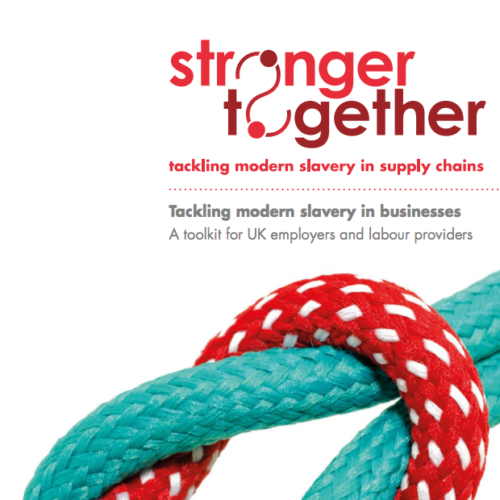 Stronger Together is a multi-stakeholder initiative which aims to reduce modern slavery. It provides guidance, training and resources to organisations, employers, labour providers, workers and their representatives. This free collection of resources includes pragmatic guidance and toolkits, and resources for the workplace including multilingual posters, leaflets and template policies. This template is to be modified as required and for inclusion with a wider Tackling Modern Slavery in Business and Supply Chain or Business Human Rights Policy.
Stronger Together is a multi-stakeholder initiative which aims to reduce modern slavery. It provides guidance, training and resources to organisations, employers, labour providers, workers and their representatives. This free collection of resources includes pragmatic guidance and toolkits, and resources for the workplace including multilingual posters, leaflets and template policies. This template is to be modified as required and for inclusion with a wider Tackling Modern Slavery in Business and Supply Chain or Business Human Rights Policy. -
 Stronger Together is a multi-stakeholder initiative which aims to reduce modern slavery. It provides guidance, training and resources to organisations, employers, labour providers, workers and their representatives. This free collection of resources includes pragmatic guidance and toolkits, and resources for the workplace including multilingual posters, leaflets and template policies. This template is to be modified as required and for inclusion with a wider Tackling Modern Slavery in Business and Supply Chain or Business Human Rights Policy.
Stronger Together is a multi-stakeholder initiative which aims to reduce modern slavery. It provides guidance, training and resources to organisations, employers, labour providers, workers and their representatives. This free collection of resources includes pragmatic guidance and toolkits, and resources for the workplace including multilingual posters, leaflets and template policies. This template is to be modified as required and for inclusion with a wider Tackling Modern Slavery in Business and Supply Chain or Business Human Rights Policy.Credit: Stronger Together
-
 Stronger Together is a multi-stakeholder initiative which aims to reduce modern slavery. It provides guidance, training and resources to organisations, employers, labour providers, workers and their representatives. This free collection of resources includes pragmatic guidance and toolkits, and resources for the workplace including multilingual posters, leaflets and template policies. This template is to be modified as required and for inclusion with a wider Tackling Modern Slavery in Business and Supply Chain or Business Human Rights Policy.
Stronger Together is a multi-stakeholder initiative which aims to reduce modern slavery. It provides guidance, training and resources to organisations, employers, labour providers, workers and their representatives. This free collection of resources includes pragmatic guidance and toolkits, and resources for the workplace including multilingual posters, leaflets and template policies. This template is to be modified as required and for inclusion with a wider Tackling Modern Slavery in Business and Supply Chain or Business Human Rights Policy.Credit: Stronger Together
-
 Stronger Together is a multi-stakeholder initiative which aims to reduce modern slavery. It provides guidance, training and resources to organisations, employers, labour providers, workers and their representatives. This free collection of resources includes pragmatic guidance and toolkits, and resources for the workplace including multilingual posters, leaflets and template policies. This template is to be modified as required and for inclusion with a wider Tackling Modern Slavery in Business and Supply Chain or Business Human Rights Policy.
Stronger Together is a multi-stakeholder initiative which aims to reduce modern slavery. It provides guidance, training and resources to organisations, employers, labour providers, workers and their representatives. This free collection of resources includes pragmatic guidance and toolkits, and resources for the workplace including multilingual posters, leaflets and template policies. This template is to be modified as required and for inclusion with a wider Tackling Modern Slavery in Business and Supply Chain or Business Human Rights Policy.Credit: Stronger Together
-
 Stronger Together is a multi-stakeholder initiative which aims to reduce modern slavery. It provides guidance, training and resources to organisations, employers, labour providers, workers and their representatives. This free collection of resources includes pragmatic guidance and toolkits, and resources for the workplace including multilingual posters, leaflets and template policies. This template is to be modified as required and for inclusion with a wider Tackling Modern Slavery in Business and Supply Chain or Business Human Rights Policy.
Stronger Together is a multi-stakeholder initiative which aims to reduce modern slavery. It provides guidance, training and resources to organisations, employers, labour providers, workers and their representatives. This free collection of resources includes pragmatic guidance and toolkits, and resources for the workplace including multilingual posters, leaflets and template policies. This template is to be modified as required and for inclusion with a wider Tackling Modern Slavery in Business and Supply Chain or Business Human Rights Policy.Credit: Stronger Together
-
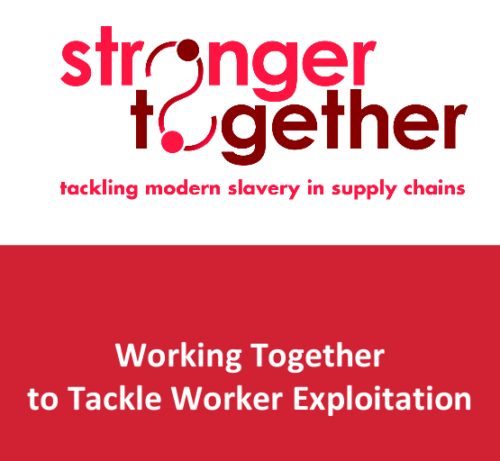 Stronger Together is a multi-stakeholder initiative which aims to reduce modern slavery. It provides guidance, training and resources to organisations, employers, labour providers, workers and their representatives. This free collection of resources includes pragmatic guidance and toolkits, and resources for the workplace including multilingual posters, leaflets and template policies. This template is to be modified as required and for inclusion with a wider Tackling Modern Slavery in Business and Supply Chain or Business Human Rights Policy.
Stronger Together is a multi-stakeholder initiative which aims to reduce modern slavery. It provides guidance, training and resources to organisations, employers, labour providers, workers and their representatives. This free collection of resources includes pragmatic guidance and toolkits, and resources for the workplace including multilingual posters, leaflets and template policies. This template is to be modified as required and for inclusion with a wider Tackling Modern Slavery in Business and Supply Chain or Business Human Rights Policy.Credit: Stronger Together
-
 Stronger Together is a multi-stakeholder initiative which aims to reduce modern slavery. It provides guidance, training and resources to organisations, employers, labour providers, workers and their representatives. This free collection of resources includes pragmatic guidance and toolkits, and resources for the workplace including multilingual posters, leaflets and template policies. This template is to be modified as required and for inclusion with a wider Tackling Modern Slavery in Business and Supply Chain or Business Human Rights Policy.
Stronger Together is a multi-stakeholder initiative which aims to reduce modern slavery. It provides guidance, training and resources to organisations, employers, labour providers, workers and their representatives. This free collection of resources includes pragmatic guidance and toolkits, and resources for the workplace including multilingual posters, leaflets and template policies. This template is to be modified as required and for inclusion with a wider Tackling Modern Slavery in Business and Supply Chain or Business Human Rights Policy.Credit: Stronger Together
-
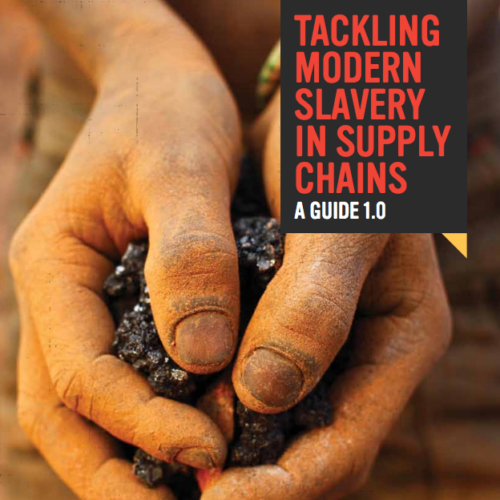 The Walk Free Foundation was established by Andrew Forrest, the Chairman of Fortescue Metals Group, after he found labour exploitation within his own supply chains and took a number of steps to prevent modern slavery affecting his business. This comprehensive guide considers corporate policy on modern slavery and provides both guidance and tools to implement it. It includes advice on corporate policy and provides template examples of a number of tools.
The Walk Free Foundation was established by Andrew Forrest, the Chairman of Fortescue Metals Group, after he found labour exploitation within his own supply chains and took a number of steps to prevent modern slavery affecting his business. This comprehensive guide considers corporate policy on modern slavery and provides both guidance and tools to implement it. It includes advice on corporate policy and provides template examples of a number of tools.Credit: Walk Free Foundation & Verite
-
 The Walk Free Foundation was established by Andrew Forrest, the Chairman of Fortescue Metals Group, after he found labour exploitation within his own supply chains and took a number of steps to prevent modern slavery affecting his business. This comprehensive guide considers corporate policy on modern slavery and provides both guidance and tools to implement it. It includes advice on corporate policy and provides template examples of a number of tools.
The Walk Free Foundation was established by Andrew Forrest, the Chairman of Fortescue Metals Group, after he found labour exploitation within his own supply chains and took a number of steps to prevent modern slavery affecting his business. This comprehensive guide considers corporate policy on modern slavery and provides both guidance and tools to implement it. It includes advice on corporate policy and provides template examples of a number of tools.Credit: Walk Free Foundation & Verite
-
 The Walk Free Foundation was established by Andrew Forrest, the Chairman of Fortescue Metals Group, after he found labour exploitation within his own supply chains and took a number of steps to prevent modern slavery affecting his business. This comprehensive guide considers corporate policy on modern slavery and provides both guidance and tools to implement it. It includes advice on corporate policy and provides template examples of a number of tools.
The Walk Free Foundation was established by Andrew Forrest, the Chairman of Fortescue Metals Group, after he found labour exploitation within his own supply chains and took a number of steps to prevent modern slavery affecting his business. This comprehensive guide considers corporate policy on modern slavery and provides both guidance and tools to implement it. It includes advice on corporate policy and provides template examples of a number of tools.Credit: Walk Free Foundation and Verite
-
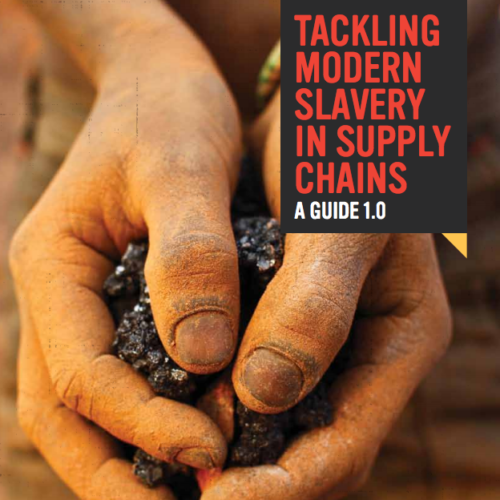 The Walk Free Foundation was established by Andrew Forrest, the Chairman of Fortescue Metals Group, after he found labour exploitation within his own supply chains and took a number of steps to prevent modern slavery affecting his business. This comprehensive guide considers corporate policy on modern slavery and provides both guidance and tools to implement it. It includes advice on corporate policy and provides template examples of a number of tools.
The Walk Free Foundation was established by Andrew Forrest, the Chairman of Fortescue Metals Group, after he found labour exploitation within his own supply chains and took a number of steps to prevent modern slavery affecting his business. This comprehensive guide considers corporate policy on modern slavery and provides both guidance and tools to implement it. It includes advice on corporate policy and provides template examples of a number of tools.Credit: Walk Free Foundation & Verite
-
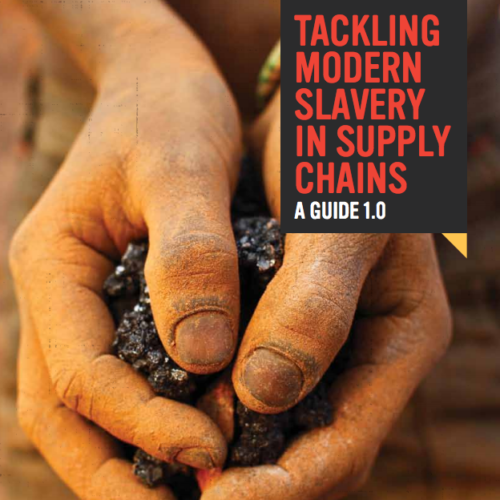 The Walk Free Foundation was established by Andrew Forrest, the Chairman of Fortescue Metals Group, after he found labour exploitation within his own supply chains and took a number of steps to prevent modern slavery affecting his business. This comprehensive guide considers corporate policy on modern slavery and provides both guidance and tools to implement it. It includes advice on corporate policy and provides template examples of a number of tools.
The Walk Free Foundation was established by Andrew Forrest, the Chairman of Fortescue Metals Group, after he found labour exploitation within his own supply chains and took a number of steps to prevent modern slavery affecting his business. This comprehensive guide considers corporate policy on modern slavery and provides both guidance and tools to implement it. It includes advice on corporate policy and provides template examples of a number of tools.Credit: Walk Free & Verite
-
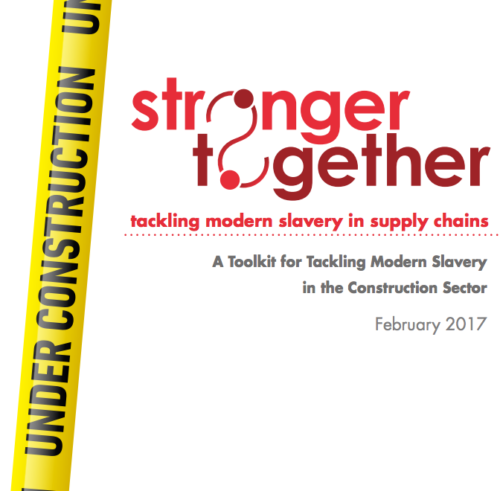 This toolkit is the result of a collaboration between the Chartered Institute of Builders and Stronger Together. It provides guidance and good practice for responsible employers and labour providers operating in the construction industry. Its aim is to support businesses set up their own policies to safeguard against human trafficking in their workforce, on sites, and in subcontracted organisations and labour providers.
This toolkit is the result of a collaboration between the Chartered Institute of Builders and Stronger Together. It provides guidance and good practice for responsible employers and labour providers operating in the construction industry. Its aim is to support businesses set up their own policies to safeguard against human trafficking in their workforce, on sites, and in subcontracted organisations and labour providers.Credit: Chartered Institute of Building (CIOB) & Stronger Together
-
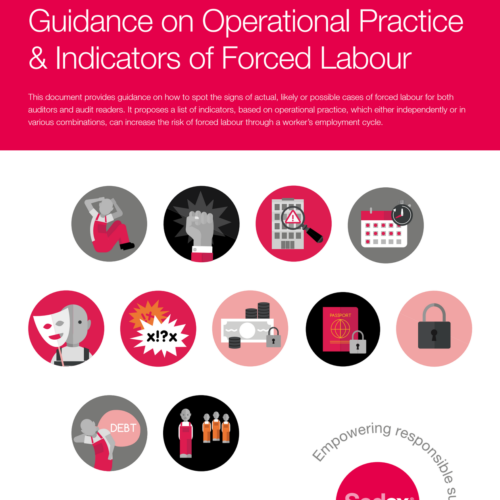 Sedex is a global NGO which provides the world's largest collaborative platform for sharing responsible sourcing data on supply chains. The Sedex Stakeholder Forum (previously the Associated Auditor Group) brings together brings together leaders across the ethical trade and responsible sourcing industry to discuss the challenges they collectively face and solve those problems collaboratively. This guidance provides information on how to spot signs of exploitation for auditors and audit readers. It includes a list of indicators of exploitation, based on operational practice, which can increase a person's risk to human trafficking. It also highlights the importance of protecting potential victims, and advises auditors on how to capture evidence and document potential exploitation of workers. It is intended for use by auditing bodies, ethical sourcing initiatives and brands to help them understand the risks of forced labour, and enhance their existing auditing protocols.
Sedex is a global NGO which provides the world's largest collaborative platform for sharing responsible sourcing data on supply chains. The Sedex Stakeholder Forum (previously the Associated Auditor Group) brings together brings together leaders across the ethical trade and responsible sourcing industry to discuss the challenges they collectively face and solve those problems collaboratively. This guidance provides information on how to spot signs of exploitation for auditors and audit readers. It includes a list of indicators of exploitation, based on operational practice, which can increase a person's risk to human trafficking. It also highlights the importance of protecting potential victims, and advises auditors on how to capture evidence and document potential exploitation of workers. It is intended for use by auditing bodies, ethical sourcing initiatives and brands to help them understand the risks of forced labour, and enhance their existing auditing protocols.Credit: Sedex
-
 The GLAA (formerly GLA) is a non-departmental public body in the United Kingdom regulating the supply of workers to the agricultural, horticultural and shellfish industries, and any associated processing and packaging industries. It has been granted police-style powers to investigate labour abuse and exploitation across all aspects of the UK labour market. Specific public authorities now have a duty to notify the Secretary of State of any person in England and Wales suspected of being a victim of human trafficking. This 10 minute video is an excellent resource for demonstrating the methods traffickers use to entrap and exploit people through modern slavery. Credit: Gangmasters and Labour Abuse Authority
The GLAA (formerly GLA) is a non-departmental public body in the United Kingdom regulating the supply of workers to the agricultural, horticultural and shellfish industries, and any associated processing and packaging industries. It has been granted police-style powers to investigate labour abuse and exploitation across all aspects of the UK labour market. Specific public authorities now have a duty to notify the Secretary of State of any person in England and Wales suspected of being a victim of human trafficking. This 10 minute video is an excellent resource for demonstrating the methods traffickers use to entrap and exploit people through modern slavery. Credit: Gangmasters and Labour Abuse Authority -
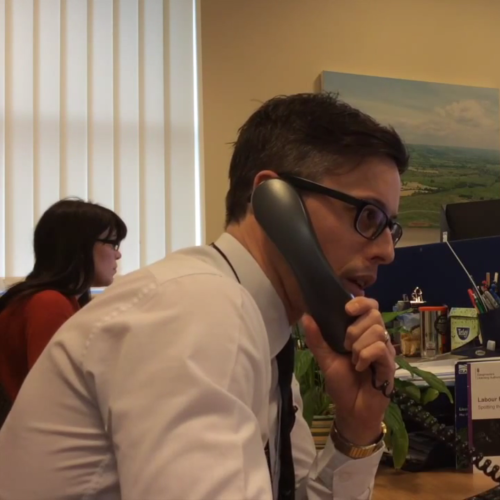 The GLAA (formerly GLA) is a non-departmental public body in the United Kingdom regulating the supply of workers to the agricultural, horticultural and shellfish industries, and any associated processing and packaging industries. It has been granted police-style powers to investigate labour abuse and exploitation across all aspects of the UK labour market. Specific public authorities now have a duty to notify the Secretary of State of any person in England and Wales suspected of being a victim of human trafficking. This ten minute video is an introduction to the indicators that can lead to an arrest for human trafficking. It is a re-creation of a call to the GLAA from a worker and points out the indicators as they emerge during the conversation. Credit: Gangmasters and Labour Abuse Authority
The GLAA (formerly GLA) is a non-departmental public body in the United Kingdom regulating the supply of workers to the agricultural, horticultural and shellfish industries, and any associated processing and packaging industries. It has been granted police-style powers to investigate labour abuse and exploitation across all aspects of the UK labour market. Specific public authorities now have a duty to notify the Secretary of State of any person in England and Wales suspected of being a victim of human trafficking. This ten minute video is an introduction to the indicators that can lead to an arrest for human trafficking. It is a re-creation of a call to the GLAA from a worker and points out the indicators as they emerge during the conversation. Credit: Gangmasters and Labour Abuse Authority

